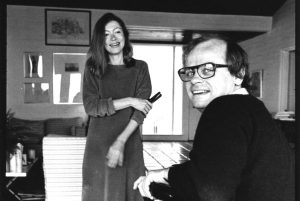[3-minute read]
Here’s a foolish thing, a very 20th-century sort of stinkin’ thinkin’. But worry not, it ends with two great women (and one fine husband, not me) sending out a peculiar but quotable encouragement, and some of us might listen.
I love writing, or having written, or at least the romance of writing. The Canadian Broadcasting Corporation, the dearly beloved Mother Corp of all Canucks leftish, artsy and true, has a long-running radio program called “Writers and Company”. It’s an hour-long conversation between the quietly enthusiastic, impeccably prepared Eleanor Wachtel and a superb range of authors: novelists, playwrights, essayists, poets, from Zadie Smith to George Saunders to Arundhati Roy. These are three of my recent listens, but I wouldn’t likely have heard them if I’d stayed in one particular mental rut.
For me, Writers ‘n’ Co was, for the longest and silliest time, mostly an occasional, accidental listen, often when I happened to be in the car and remembered what time it was: specifically, the Sunday 3 pm slot on CBC’s Radio 1, where Wachtel has been asking her terse but evocative questions since 1990. I’d catch part of a conversation, sometimes the whole thing if there was a writer known to me, and I’d regularly and fervently resolve to never miss another; I found each episode thrilling as a teacher of readin’ ‘n’ writin’, and began to connect it to my own spastic undertakings as a scribbler. (A gutsier, more daring me might have blustered, Wachtel’s gonna interview ME one day. Well. Maybe not. I finally did meet her, briefly, a year or so ago. She was plainer and funnier than she had always sounded to me, that sombre but voluptuous voice teaching me from tinny speakers.)
But I was never much of a planner, and the number of interviews I caught was small compared to the torrent of writer-talk that was available. As recently as 2016, I’d scourge myself for missing another piece of Appointment Radio, and my bride would roll her eyes. And then I reluctantly inherited a used smart phone from her impatient self. I pocket-dial with ridiculous ease, at least during those times when I remember to keep the cursed thing with me, and I just figured out the flashlight function. I’ve taken, um, maybe seven photos in as many months. I don’t use it much or well, but I’ve got podcasts figured out, and I’ve been binge-listening to Eleanor Wachtel and Company (and Bill Simmons, and Dave Zirin, and Michael Enright, and Malcolm Gladwell…) while dishwashing, driving, painting and generally twiddling my digits.
Last spring, Ms. Wachtel’s pod brought me Joan Didion, famed (but little read by me) American novelist and cultural critic, and her 2005 memoir The Year of Magical Thinking. (I finally bought it, and I’ll get to it, I’ll get to it.) It was a difficult but marvellous interview, centring on Didion’s account of the year following her husband’s death and the harrowing health crises of their daughter. It was a masterful tour of a writer’s thinking, but it was this exchange that gripped me hard. (And here comes the Money Quote!)
Wachtel sketches a story that Didion tells in her memoir, of the last birthday she spent with her husband of 40 years, John Gregory Dunne. It was December 5, Didion’s birthday, two weeks before her adult daughter Quintana fell into a coma (she died within two years after a terrible series of collapses and recoveries), and only three weeks before Dunne himself was to die of a massive heart attack. He had been reading from her 1977 novel A Book of Common Prayer. He read aloud to her, a fairly complex scene, and when he finished offered this gruff birthday gift:
“God damn, don’t ever tell me again you can’t write!”
Wachtel: “Did you believe him?”
Didion: “Well, you do, until you’re writing something again!”
Yep, she done tole the whole truth. I was similarly moved by Margaret Atwood, “descending into the Writing Burrow” anew this summer, and tweeting her own never-failing self-doubt – after her career, after 40 books – at facing the white screen, the blank page, the unstarted thing. It’s a consolation to a writer, but also a stealthy rebuke, because these women have DONE IT; they’ve stared down that demon a million times. This is courage of a kind I wish I could better imagine, and more often demonstrate.

